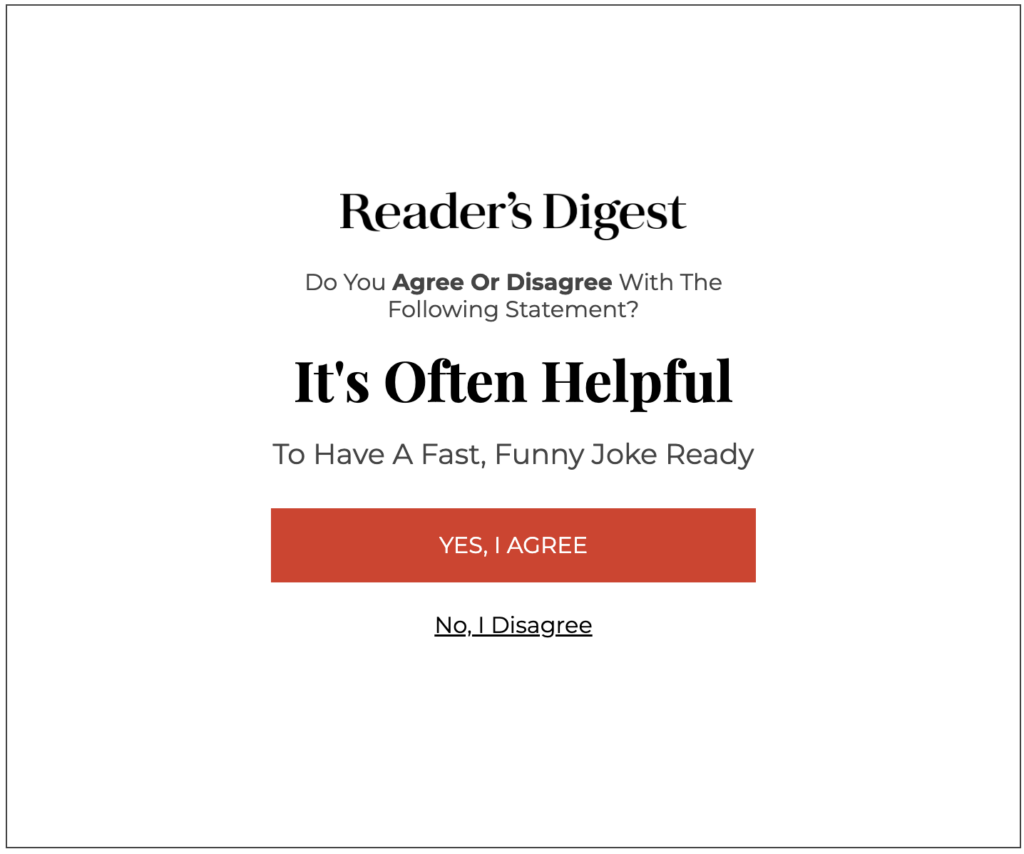In 4th grade I made it into the state finals of a Reader’s Digest dictionary contest.
Imagine:
Me.
10 years old.
Hair in a cute li’l bob.
4-ish feet tall.
Surrounded by a bunch of 8th graders scribbling away on their test packets while proving they had the definitions of words like defenestrate rolling around in their brains.
(Defenestrate, in case you’re wondering, means to throw someone out of a position of power — or to throw them out a window, whichever floats your vocabulary boat.)
Annnnnywho. I didn’t make it to the Reader’s Digest state finals because I wanted to.
I did it because I had to.
Because just seconds before walking into the testing room, a boy in my class named Bobby McGee (sadly not his real name) told me that girls weren’t good with words.
And ohhhhhhhh boyy you better believe I sharpened my #2 Ticonderoga pencil, put my hair in a ponytail, and set out to prove something to Bobby McGee.
(According to some *light* internet sleuthing Bobby McGee is now a stock trader in NYC with a high school chess championship under his belt. Hopefully he’s changed his tune about the whole girls-words thing in the last 2-ish decades.)
Annnnnywho.
If you had asked me at any point in the last 20-ish years what I knew about Reader’s Digest, that’s the story I would have slapped you with.
Until yesterday.
When I happened to stumble upon a Reader’s Digest web page that was working harder than those middle school brains jockeying for a scholarship.
If you’ve ever read the book Pre-suasion by marketing psychologist Cialdini, then what I’m about to say might ring a bell or two.
(And if you haven’t? No biggie: I got an explanation for you, boo!)
In Pre-suasion, Cialdini references a study where researchers walked on up to random mall shoppers and asked them to participate in a marketing survey.
Initially, only 29% of shoppers agreed.
(Can you blame them? Stopping your shopping for a mall survey?? I mean, blech.)
But then the researchers flipped things fully up.
And instead of going straight for the kill, they started each convo with: “Do you consider yourself a helpful person?”
That easily, their agreement rate skyrocketed up to 77%.
Let that number sink in: Seventy seven percent!!!
Now: I can pretty much guarantee that someone at Reader’s Digest has Cialdini’s book dog-eared with this passage highlighted in red.
Because the first moment you land on their web pages, you get hit with this little Q:

If you click “No, I Disagree”…the pop-up disappears into the internet ether for good.
But if you happen to click “Yes, I Agree”…you get to be the lucky winner, winner chicken dinner who gets a second pop-up on your screen. A second pop-up that now says:

Now, let’s start with the stuff that deserves a gold star. With this pop-up 1-2 punch, Reader’s Digest is:
✅ Establishing alignment between you and their offer: by literally saying “you agree to this statement…or the freebie we’re about to drop in your lap isn’t for you.”
✅ Priming your brain to want the thing that follows: by activating your memory of how freaking nice it is to have a joke to tell at the exact freaking moment you freaking need it.
But pay attention: because this is where strategy begins to be flown out of the proverbial window.
❌ That second pop-up isn’t telling you anything about what you actually get by putting your email address in: is it a weekly newsletter? A talking monkey that sits on your shoulder and whispers crowd-zingers into your ear at parties?
Without knowing, chances of handing over your email address are low. (Because who wants to sign up to clothe, bathe, and feed a talking monkey without a little forward warning?)
❌ The content they’re delivering doesn’t actually line up with their brand…like, barely at all.
Last time I checked, Reader’s Digest isn’t the go-to resource for comedians. (Their home page laments the 3 items you won’t be able to find at Costco in 2025…need-to-know info for sure, but more tragic than tragically comedic.)
Which means even if they do get subscribers from this, there’s a pretty good chance they won’t be fully aligned with who they want.
Annnnnywho.
Good technique.
But I think you could do it better.
Want to talk about how?
Hit me up 🙂
‘Kay byyyeeee!
Regan